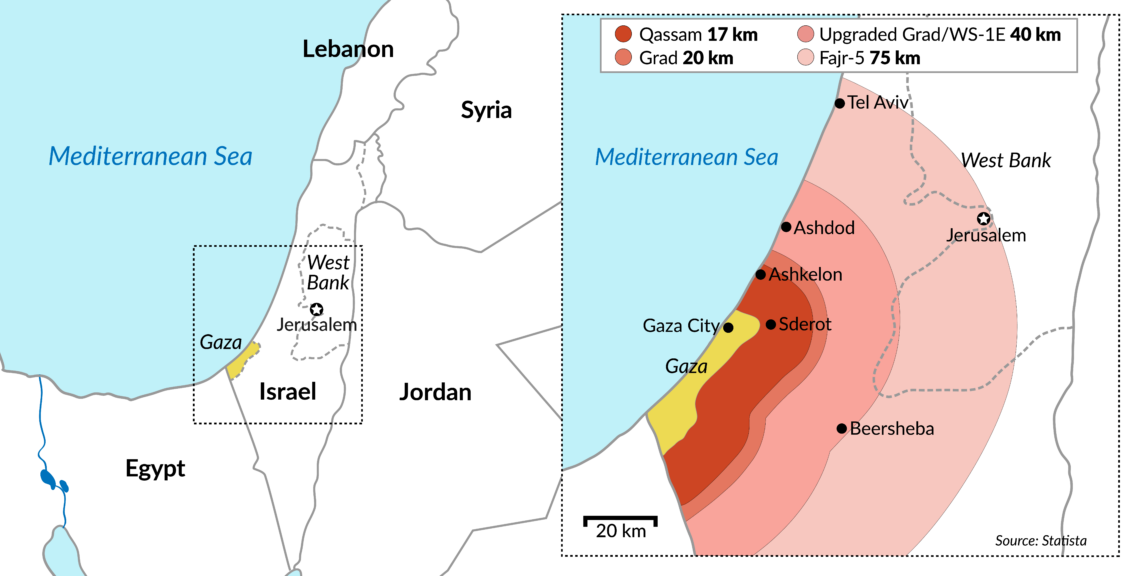Terrorism is incompatible with peaceful solutions
The renewed fighting between the Palestinian territories and Israel is not the root cause of instability in the region. Rather, it is the manifestation of a broader turmoil, made worse by the international community’s tolerance of terrorism in the Middle East.

Israeli-Palestinian tensions have flared up in recent weeks. After clashes at a site holy to both Jews and Muslims, a radical Palestinian faction represented by Hamas and the Palestinian Islamic Jihad (PIJ) started firing thousands of rockets toward Israel. Although the Israeli air defense system, the so-called Iron Dome, succeeded in grounding more than 90 percent of rockets, a number of Israelis were killed or injured.
Irreconcilable positions
The situation is remarkably complicated. The autonomous Palestinian territories are split into two parts. The West Bank, in the east of Israel, is a patchwork of Israeli and Palestinian settlements. The Gaza strip, in the southwest, is a tiny, densely populated area with mostly Palestinians resettled from Israel – nearly two million people on 360 square kilometers. Gaza is dominated by Hamas, an organization labeled terrorist by the European Union and the United States, and shelters the Iran-backed PIJ.
Israel’s Iron Dome is a very effective radar system and control center. It uncovers projectiles immediately after they are launched and calculates their targets and trajectories. This is combined with rocket launchers to destroy enemy missiles. Nearly all leaders worldwide have admonished Israel and the Palestinians to seek peace – a futile effort mainly meant to impress the electorate and the media in their own countries.
Attempting to change history will always create injustice.
So far, negotiations have failed due to irreconcilable positions. Now terrorist warfare is paralyzing the process. It is true that mistakes were made, but perceived past injustice does in no circumstances justify terrorist attacks against innocents. It also does not legitimize terrorists’ cowardly practice of using civilians as a living shield. Fighting groups in Gaza have resorted to this measure, and also Hezbollah, a terrorist group active in Lebanon that threatens northern Israel with its rocket capacities.
The U.S., backed by a large part of the international community, wants to find a two-state solution – with both an Israeli and a Palestinian state. However, groups like Hamas, supported by the regime in Tehran, deny that the state of Israel has the right to exist. This stance is unacceptable and unrealistic, whatever one thinks of past events. Although Israel also has its hardliners, and has inflicted damage to the other side, its people settled there generations ago and must be accepted and recognized. Attempting to change history will always create injustice.
Symptom of instability
Recent events are rooted in more than just the conflict between Israel and the Palestinians; it is part of the general tension burdening the Middle East. Regional powers have been clashing there for some time because of broader geopolitical interests. Most of the armed conflicts, like those in Syria and Yemen, are in great part proxy wars for other nations. The Israeli-Palestinian conflict is not, as some observers claim, the root of instability in the region, but one of its symptoms.
In its quest for hegemony, Iran is directly sponsoring the PIJ and supporting Hamas. The rockets used are either Iranian or built in Gaza with Iranian support.
The international community must stop tolerating or excusing terrorism in the Middle East.
It must be kept in mind that Israel’s very existence is jeopardized and it is now fighting for survival. The Iron Dome offers broad protection against strikes from Gaza. But what would happen if other terrorist groups also began attacking Israeli territories? Hezbollah in southern Lebanon could pose a threat, and a number of Iran-backed Jihadist fighters involved in the Syrian war are now close to the Israeli border. Israel has no choice but to operate abroad to prevent this outcome.
Solutions to the Middle East’s problems will be local. International interventions will fail. Foreign countries can only serve as a platform to allow regional leaders to meet. With the Abraham Accords, the U.S. facilitated peace between Israel and leaders of the Arab peninsula – something that both parties already wanted. It appears that other direct discussions will follow. The Iran nuclear deal talks is an example to the contrary because it did not involve other Middle Eastern countries and did not require Iran to stop supporting insurgency and terror attacks. This state of affairs is likely to have unfortunate repercussions and has already caused unrest.
The most important conclusion to draw from the current escalation is that the international community must stop tolerating or excusing terrorism in the Middle East. Terrorist operations will inevitably prevent any constructive solution from being found, and positions will harden on both sides.
